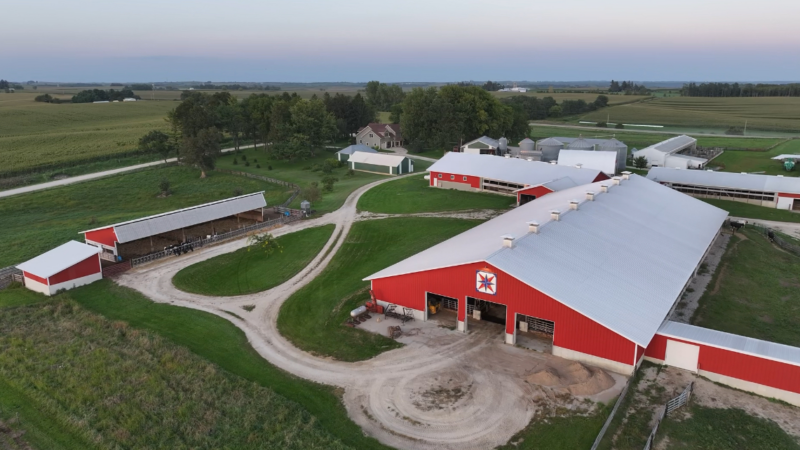Deportees are being held in a converted shipping container in Djibouti, ICE says
A group of deported migrants is living in a converted shipping container at a U.S. military base in Djibouti, a country in East Africa, where they are guarded around the clock by a small team of U.S. Immigration and Customs Enforcement officers, according to a Thursday court filing.
Several migrants have been stuck at the base for more than two weeks, after the airplane they were on, which was originally bound for South Sudan, was rerouted mid-trip due to a federal judge’s ruling. The court ruling came after multiple people facing deportation fought the Trump administration’s effort to send them to South Sudan. Now, their case has reached the Supreme Court, which could issue a ruling at any time.
It’s the latest example of migrants being caught in the legal crosshairs between Trump’s efforts to streamline deportations and the courts’ push for due process.
Since the flight landed in Djibouti, ICE officers have been left with limited resources, and the migrants have been held with very limited communication with their families and no communication with their lawyers, according to the court filings. On Wednesday, lawyers for the migrants said some of the detainees were able to make contact with family members for the first time since being put on the flight on May 20.
ICE did not immediately respond to a request for comment on why the officers and migrants were still in Djibouti.
Working and detention conditions are dire
In the Thursday court filing, Mellissa Harper, acting deputy executive associate director at ICE, said that the migrants are being held in a conference room in a converted Conex shipping container at Camp Lemonnier, a U.S. Naval Base.
She said the ICE contingent includes 11 officers assigned to guard the deportees, and two officers to support medical staff. The ICE personnel are working 12-hour shifts and Harper noted they “do not have the capacity to maintain constant surveillance, custody, and care of the aliens for prolonged periods of time.”
Harper said in a sworn declaration that the daily temperature where the migrants are being held has exceeded 100 degrees Fahrenheit. The conference room where deportees are housed is “not equipped nor suitable for detention of any length” and ICE officers are sharing a small sleeping space with only six beds.
Harper described a series of additional concerns including exposure to malaria and close proximity to “burn pits” — a method of disposing trash and human waste in the country, she wrote. She said the pits “create a smog cloud” that causes throat irritation and difficult breathing.
She also said ICE officers and detainees complained of feeling ill within three days of their arrival to the base. Some officers have slept wearing N-95 masks, but access to medication is limited, she said.
“ICE officers continue to feel ill with symptoms such as coughing, difficulty breathing, fever, and achy joints,” Harper said in her declaration. “These symptoms align with bacterial upper respiratory infection, but ICE officers are unable to obtain proper testing for a diagnosis.”
Terrorist attacks, Harper said, are also a risk. Both the officers and detainees lack body armor and other gear in case of an attack from terrorists in Yemen, across the Gulf of Aden from Djibouti, she said.
Why did the plane stop and stay in Djibouti?
On May 20, news emerged that the U.S. was moving to deport a group of men, apparently to South Sudan. A Homeland Security filing in federal court in Massachusetts states that the deportees who were on the plane include two citizens of Cuba and two from Burma, along with natives of Laos, Mexico and Vietnam.
All of the men have criminal records, according to the government’s filings, and U.S. Department of Homeland Security officials have alleged that their home countries refused to take them back.
On May 21, federal judge Brian Murphy ordered that the migrants stay in DHS custody, instead of being released in South Sudan, in order for the department to give them more time to contest their deportation to the African country.
Murphy did not specify in his order where geographically the detainees needed to be held, and the deportation flight wound up in Djibouti.
On May 27, Solicitor General D. John Sauer asked the Supreme Court to place a stay on Murphy’s injunction regarding deportations. Sauer told the high court on Thursday that the Trump administration was “forced to establish a makeshift detention facility for dangerous criminals at a military base in Djibouti.”
The team of ICE officers that was originally assigned to the deportation mission was replaced and expanded on May 27, according to court filings.
What is Camp Lemonnier?

Camp Lemonnier is the main base of operations for U.S. Africa Command in the Horn of Africa, according to the Navy. The facility spans nearly 500 acres and supports around 4,000 personnel — a mix of U.S. and allied military and civilian staff.
Service members stationed at the base are eligible for several pay increases. According to the Navy, personnel can receive “imminent danger pay” ($225 each month), which is associated with the risk of hostile fire, along with hardship duty pay ($100 a month).
But the installation also includes aspects of everyday life in the U.S. It has a Pizza Hut, for instance, and a Planet Smoothie that’s next to a gym. Two coffee shops are open 24 hours a day.
Service members posted to the base live in “Containerized Living Units,” or CLUs, according to the base’s housing guide. Typically, each unit has a door and window, “and a robust air conditioner,” the guide states.
“The standard CLU is much like the shipping containers or CONEX boxes you might have seen being pulled by trucks or down at the port being loaded onto container ships,” according to the guide. “The CLUs can be stacked and arranged neatly to form their own sort of community here at the camp.”
Out with the mayo: How Ukrainians reclaim holiday food
For many people from former Soviet countries, New Year's is a big holiday feast time. A Ukrainian restaurant in Washington gives NPR a taste of what's on the menu.
His brother’s mental illness isolated his family. Now he’s helping other caregivers
When it comes to serious mental illness, family caregivers are crucial partners. But often, they must fend for themselves. A new solution offers them support.
50 wonderful things from 2025
Each year, critic Linda Holmes looks back on the year and compiles a list of the things that brought her joy.
Farmers are about to pay a lot more for health insurance
Tariffs, inflation, and other federal policies have battered U.S. farmers' bottom lines. Now many farmers say the expiration of federal health care subsidies will make their coverage unaffordable.
Why do we make New Year’s resolutions? A brief history of a long tradition
One of the earliest mentions of New Year's resolutions appeared in a Boston newspaper in 1813. But the practice itself can be traced back to the Babylonians.
Judge orders new trial for Alabama woman sentenced to 18 years in prison after stillbirth
Lee County Circuit Judge Jeffrey Tickal vacated Brooke Shoemaker’s 2020 conviction for chemical endangerment of a child resulting in death. Tickal said Shoemaker's attorneys presented credible new evidence that the infection caused the stillbirth.








